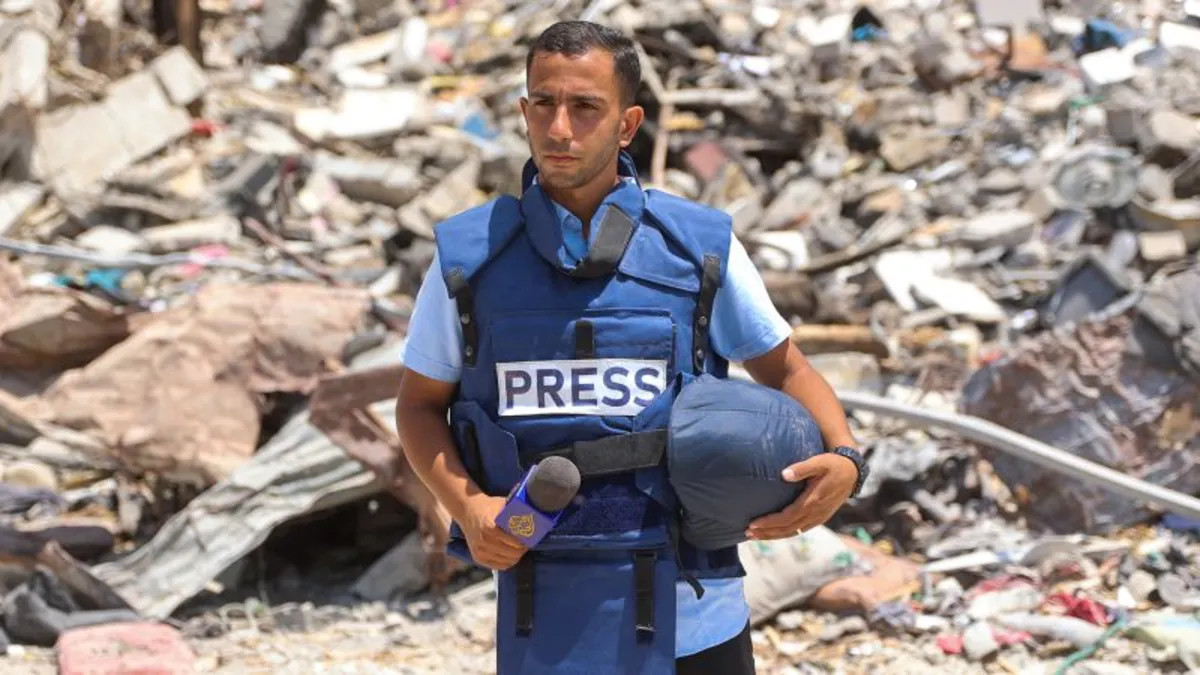
As a ceasefire in Gaza took hold in January, Anas Al-Sharif dramatically removed his protective gear live on television, piece by piece, amid cheers from a jubilant crowd. This moment symbolized the hope for an end to the suffering of 2 million Palestinians in the enclave. Nearly seven months later, tragedy struck when Israel killed the Al Jazeera journalist, along with four of his colleagues, in a strike on Gaza City. Al-Sharif, one of the most recognized Palestinian journalists, was among dozens killed by Israeli forces during the ongoing conflict, igniting international outrage and calls for accountability.
The 28-year-old Al-Sharif became the voice of the Gaza story for millions, especially as Israel restricted access for international media outlets. Before the war, he was relatively unknown, but his daily coverage of the conflict quickly made him a household name across the Arab world. His reports included first-hand accounts of significant moments, such as the temporary ceasefires, the release of Israeli hostages, and the harrowing stories of starvation that shocked audiences worldwide.
Al Jazeera recruited Al-Sharif in December 2023 after viral footage of Israeli strikes in his hometown of Jabalya caught their attention. Initially a professional cameraman, he was hesitant to appear on air but was convinced by colleagues to share his reports. He described the experience as “indescribable,” recalling, “I had never even appeared on a local channel, let alone an international one,” as he reflected on his father's pride in his new role.
Tragically, his father was killed in an Israeli airstrike shortly after Al-Sharif began his tenure at Al Jazeera. As a father of two, Al-Sharif appeared on the channel nearly every day, often recounting the extreme conditions under which journalists operated. “We (journalists) slept in hospitals, in streets, in vehicles, in ambulances, in displacement shelters, in warehouses, with displaced people. I slept in 30 to 40 different places,” he shared.
During a live broadcast in January, after removing his protective gear, crowds lifted Al-Sharif on their shoulders in celebration. “I am taking off the helmet that tired me, and this armor that has become an extension of my body,” he stated, paying tribute to colleagues who had been killed and injured in Israeli strikes on Gaza. His courageous reporting drew the attention of the Israeli military, which warned him to cease his work for Al Jazeera, a network that had already lost several staff members to Israeli actions.
The Israel Defense Forces (IDF) accused Al-Sharif of being linked to Hamas, a claim he vehemently denied. He asserted, “I, Anas Al-Sharif, am a journalist with no political affiliations. My only mission is to report the truth from the ground – as it is, without bias.” Following his death, the IDF claimed he led a Hamas cell, although the basis for this accusation remained unclear. The military produced documents alleging ties between Al-Sharif and Hamas, further escalating the controversy surrounding his killing.
The killing of Al-Sharif prompted swift condemnation from rights groups and officials. The Committee to Protect Journalists expressed its horror, highlighting a pattern of accusations against journalists without credible proof. Since the war's onset nearly two years ago, 192 journalists have been killed, with 184 of those being Palestinian journalists, primarily at the hands of Israeli forces.
Just hours before the strike that killed Al-Sharif and his colleagues, Israeli Prime Minister Benjamin Netanyahu announced that foreign journalists could enter Gaza but only under military supervision, continuing a restrictive embed policy in place since the conflict began.
Al-Sharif was laid to rest in Gaza, where a large crowd of mourners gathered to pay their respects. In a poignant farewell, he had written a will anticipating his own death, stating, “If I die, I die steadfast upon my principles. Do not forget Gaza … and do not forget me in your sincere prayers for forgiveness and acceptance.” His legacy as a fearless journalist committed to the truth will endure as a testament to the ongoing struggle in Gaza.